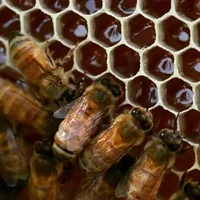Another example: USDA
suspends honey bee tracking
 On the heels of the
EPA's June approval of a bee-killing pesticide, the White House said it would
stop collecting data on declining honey bee populations—potentially making it
impossible to analyze the effects of the chemical and the administration's other
anti-science policies on the pollinators.
On the heels of the
EPA's June approval of a bee-killing pesticide, the White House said it would
stop collecting data on declining honey bee populations—potentially making it
impossible to analyze the effects of the chemical and the administration's other
anti-science policies on the pollinators.
The U.S. Department of
Agriculture (USDA) cited budget cuts when it said that it would indefinitely suspend data
collection for its Honey Bee Colonies report, which has been compiled every
year since 2015.
The report helps scientists and farmers to assess the decline of honey bees, which are responsible for pollinating one in every three bites of food taken by humans.
The report helps scientists and farmers to assess the decline of honey bees, which are responsible for pollinating one in every three bites of food taken by humans.
The number of honey bee hives in the U.S.
dropped from about six million in 1947 to just 2.4 million in 2008, with 2018
being the worst year on record for hive loss. Beekeepers reported last year that 40 percent of
honey bee hives had collapsed, due to a combination of factors including the use of pesticides.
Scientists say
continuously monitoring the health of honey bee hives in vital to understanding
why and how they are in decline.
"The value of all these surveys is its continuous use over time so you can compare trend lines," Dennis vanEngelsdorp, an entomologist at the University of Maryland, told CNN.
"We need some
sort of thermometer to be able to determine, at a big scale, are we actually
helping to turn around hive loses, to turn around pollinator declines,"
Mace Vaughan of the Pollinator Conservation Program at Xerces Society told the outlet. "Understanding
what's going on with honey bees is incredibly important to having a sense of
what's impacting pollinators in general."
The decision to
suspend the data collection came just a few weeks after the administration approved the so-called
"emergency" use of the bee-killing pesticide sulfoxaflor on nearly 14
million acres.
The pesticide, sold under the brand names Closer and Transform, was banned in 2015 after a lawsuit by beekeepers and farmers, but the administration used a loophole in the Federal Insecticide, Fungicide, and Rodenticide Act, granting an exemption to 11 states for four to six years.
The pesticide, sold under the brand names Closer and Transform, was banned in 2015 after a lawsuit by beekeepers and farmers, but the administration used a loophole in the Federal Insecticide, Fungicide, and Rodenticide Act, granting an exemption to 11 states for four to six years.
"This
administration has been grossly abusing this exemption to allow the use of this
one pesticide called sulfoxaflor on a vast acreage year after year," Lori
Ann Burd, environmental health director for the Center for Biological
Diverity, told EcoWatch.
Friends of the Earth
called the approval of the pesticide "inexcusable."
Brianna Westbrook, a
progressive candidate for U.S. Congress in 2018, sarcastically wrote on social
media that it was likely "a coincidence" that the decision to stop
collecting data on bee colonies came just after the sulfoxaflor approval.
The suspension of the
Honey Bee Colonies report represents President Donald Trump's allegiance to the
powerful corporations behind dangerous pesticides, said critics, and his
refusal to institute and continue programs aimed at furthering public health.
"This is yet
another example of the Trump administration systematically undermining federal
research on food safety, farm productivity, and the public interest writ
large," Rebecca Boehm, an economist at the Union of Concerned Scientists,
told CNN.
"This might seem
minor," said former U.S. Attorney Joyce Vance,
"but it's another example of Trump's administration prioritizing profit
over our wellbeing."